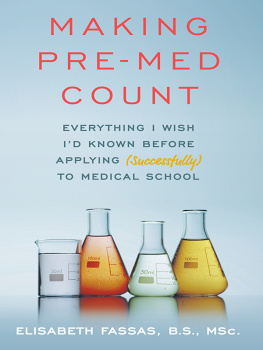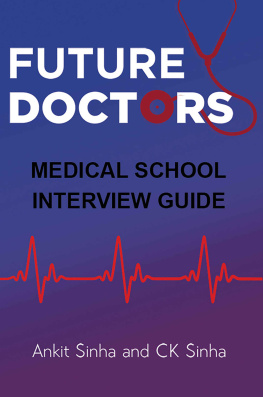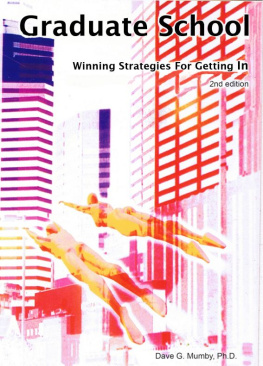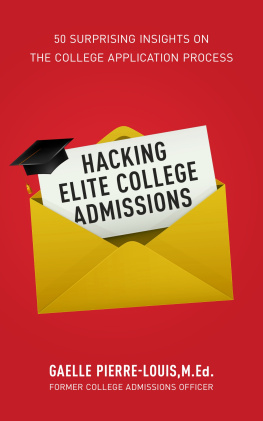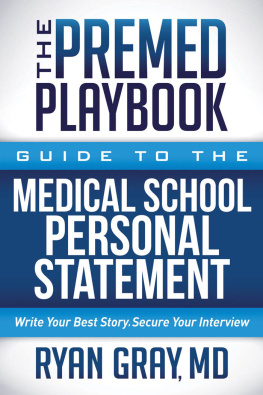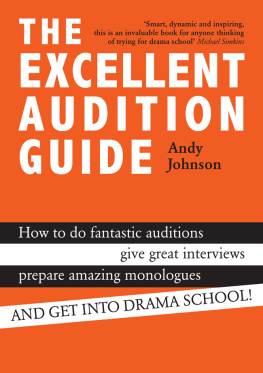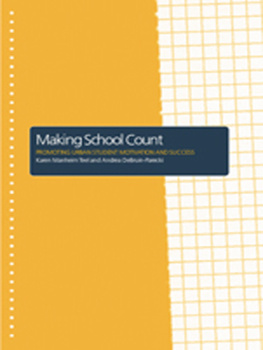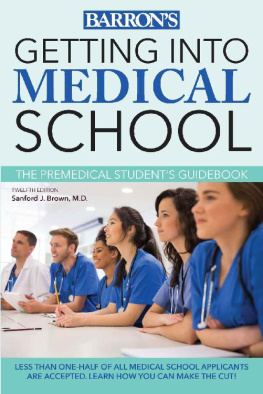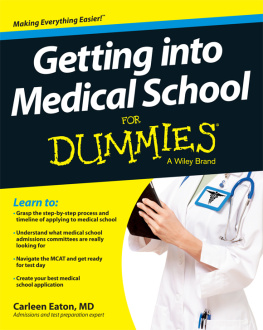Table of Contents

MAKING PRE-MED COUNT
EVERYTHING I WISH ID KNOWN BEFORE APPLYING (Successfully) TO MEDICAL SCHOOL

ELISABETH FASSAS, B.S., MSc.
This publication is designed to provide accurate information in regard to the subject matter covered as of its publication date, with the understanding that knowledge and best practice constantly evolve. The publisher is not engaged in rendering medical, legal, accounting, or other professional service. If medical or legal advice or other expert assistance is required, the services of a competent professional should be sought. This publication is not intended for use in clinical practice or the delivery of medical care. To the fullest extent of the law, neither the Publisher nor the Editors assume any liability for any injury and/or damage to persons or property arising out of or related to any use of the material contained in this book.
2020 Kaplan, Inc.
Published by Kaplan Publishing, a division of Kaplan, Inc.
750 Third Avenue
New York, NY 10017
All rights reserved. The text of this publication, or any part thereof, may not be reproduced in any manner whatsoever without written permission from the publisher.
10 9 8 7 6 5 4 3 2 1
Printed in Canada
ISBN: 978-1-5062-5818-8
Kaplan Publishing print books are available at special quantity discounts to use for sales promotions, employee premiums, or educational purposes. For more information or to purchase books, please call the Simon & Schuster special sales department at 866-506-1949.
Acknowledgements
To A, V, A, and Cthank you for all of your love and support consistently.
To the Notes and Ranvier and the friends and peers who talked me through their admissions process and offered words of wisdom, thank you for your time and your openness.
Table of Contents
INTRODUCTION
So you want to go to medical school, huh? Fantastic!
Im sure you are equal parts excited and stressed about this planor at least, Im sure there will be times over the next few years when you will be.
Your four years (or more) of pre-med will be riddled with decisions and wrought with opportunity for stress, anxiety, and comparison to others. It will also set you up to get successfully into and through medical school, where you will be privileged enough to gain the knowledge necessary to serve your patients and your community in a way only doctors can.
Its going to be amazing! And you have picked up a great resource to help you through this process. This book is a compilation of everything you need to know about and think about as you apply to medical school, complete with insiders tips, tricks, and knowledge, and pep talks from pre-med advisors, admissions officers, and students who are either going through or have just finished this process.
My name is Elisabeth and I am the narrator of this story. I have successfully made it to other side, having received my coveted acceptance to medical school, and want to use my 20/20 hindsight to shine some light on some common pitfalls. I probably wont help you avoid them all, but maybe I can help with a few as you traverse the long and winding road to a medical school admission.
Lets talk about that road for a second. Most available resources, your pre-professional advisors, and everyone who has made it to the finish line presents it, in my experience, as a single-lane street. You pass academics, extracurricular activities, research, and clinical experience and then BOOM, you land yourself in a matriculating class. At least, thats how I had visualized it before getting started.
What most pre-meds will tell you, however, is that this road is riddled with potholes, dead ends, and intersections that will require you to choose to turn one way or the other. Your ability to trek through to the end depends on making millions of decisions that all seem, in their own right, infinitely impactful. Chances are, you will spend many, many days of your pre-med years feeling like youre running through quicksand. Every choice you make will necessarily eliminate the possibility for another, and you will undoubtedly second-guess yourself. It is unavoidable: the medical school application process is just transparent enough to make you feel like everyone around you is doing something more interesting than you are, and just opaque enough to make you feel as though youve spent the last four years playing Russian roulette blindfolded.
I, and (as I found out later) many of my friends and peers, spent a long time obsessing over all of the things we could have done, all of the tick boxes we could have checked, and the experience points we could have collected. If you take nothing else from this book, this is the most important lesson: as you look backward to the path you didnt take, you will miss the potholes ahead of you and move more slowly than if you had forged ahead with your full might and attention. Oh, and that whatever you do is probably much more interesting when you put it on paper than you thought it would be when you were doing it.
I began to write this resource because I realized a very sobering fact about the medical school application process and the academic environments within which students stories are playing out every day. Universities, even those with plenty of resources and staff, often fall short in the number of pre-professional advisors they have available for students to access. Now, the ones they do have (at least the ones I know), are absolute superheroes. They field emails from anxious students and help to create action plans and strategies that help their students get into their dream schools. The problem is that there are often too few advisors to go around when students are in college. An even bigger problem is that after graduation, those resources all but disappear for alumni, leaving students who decide to pursue medicine relatively late in the game, or otherwise nontraditional students, with the short end of the stick in terms of solid, industry-informed advice about the nuances of the application process. This is problematic because even for the perfect applicant the average acceptance rate still hovers at around 7% per medical school, and honestly, I think we each need all the help we can get.
I wrote this book fresh out of the medical school application process, after spending nearly an entire year maneuvering through what felt like a minefield. I had to make thousands of little decisions about the different pieces of my application without really knowing the criteria that my choices would be judged against. So, I set out to answer the million-dollar question: What are medical school admissions committees looking for anyway?
If you are a current student, I hope this book will provide guidance and direction as you plan out your personal journey to medical school. If you are finished with your pre-med years and are looking to apply, I hope this book will help frame the experiences you have amassed in the best possible light.
To do this, I spent the last several months on a quest to pick the brains of as many current and former pre-meds, admissions officers, and pre-med advisors as possible, to determine what applicants can do to be most successful in this process. The quotes herein are from real people offering real advice, but the student scenarios they describe are indicative of types of students, rather than actual students.
For all applicants, aspiring applicants, and cheer squads to a very special pre-med, this book can serve three main purposes:

